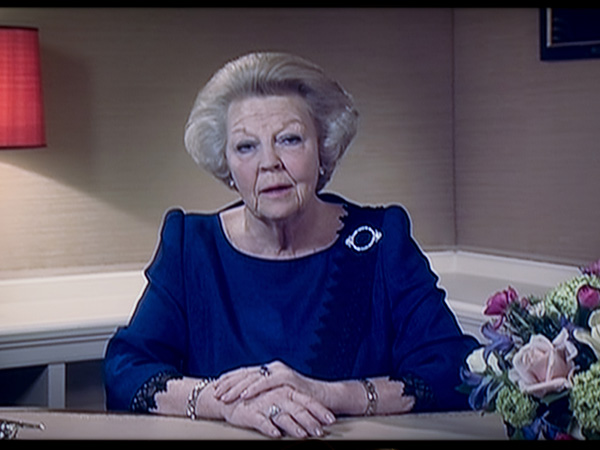
Image taken of a TV screen showing Dutch Queen Beatrix announcing she will abdicate April 30, 2014, during a speech prerecorded in The Hague, Netherlands, Monday Jan. 28, 2013. Beatrix, who turns 75 on Thursday, has ruled the nation of 16 million for more than 32 years and would be succeeded by her eldest son, Crown Prince Willem-Alexander. AP/NOS Television/Peter Dejong
THE HAGUE—Queen Beatrix of the Netherlands announced Monday that she would abdicate in favor of her son Crown Prince Willem Alexander at the end of April after 33 years in power.
“It is with the greatest of confidence, that I will hand over the throne on April 30 to my son, Willem Alexander, Prince of Orange,” Beatrix told national television, using the official title of the heir apparent.
The queen, who is to turn 75 on Thursday, said her birthday and the 200-year anniversary of the monarchy in 2013 “were the reason for me to step down”.
“I’m standing down because public service is too heavy for me, because of the belief that responsibility for our country should be in the hands of a new generation,” she said.
Liberal Prime Minister Mark Rutte spoke immediately after the queen.
“She has always done her utmost for Dutch society, being visible and with enormous energy,” Rutte said.
“She has grown into a Dutch icon,” he said, also paying homage to Willem Alexander.
“He and Princess Maxima are fully prepared for the task,” Rutte said. “They will serve our country with devotion.”
Beatrix’s much-loved mother Juliana also abdicated, in 1980, when her daughter stepped into her shoes at age 42.
Beatrix’s abdication ends more than 100 years of female reign on the Dutch throne.
Willem Alexander, 45, will become the first Dutch king since Willem III, who reigned until his death in 1890.
The announcement was “totally unexpected,” royal expert Reinildis van Ditzhuyzen told the NOS public broadcaster.
“An abdication takes a lot of organisation,” Van Ditzhuyzen added.
State broadcaster NOS began broadcasting footage from significant moment’s during the queen’s soon after her speech was announced.
Beatrix chose to turn her palace into a “palace of work” in The Hague, the seat of government of the country with a strong work ethic.
But when renovations were announced at Beatrix’s distinctive octagonal-shaped Drankensteyn castle southeast of Amsterdam in 2006, some saw a herald of her abdication.
Beatrix’s German-born husband prince Klaus died in 2002 aged 76.
Dutch festivities during the coronation will be tinged by concerns for the health of Willem-Alexander’s younger brother Prince Friso, who has been in a coma since being hit by an avalanche in Austria in February 2012.
Contrary to her mother’s unobtrusive style of rule, Beatrix refused to be relegated to ribbon-cutting; changing the mode of address from “madam” to “majesty”, and transforming one of the royal palaces in The Hague, the seat of government, into a working palace.
She received heads of state in her affable though formal manner and met weekly with successive prime ministers to discuss matters of government, earning the nickname “chief executive officer of the Netherlands”.
She also signed laws and played an important role in Dutch politics by appointing the so-called “formateur” who explores possibilities for coalition government after general elections.
Last year’s elections in which Prime Minister Rutte was elected to head government for a second time, marked the first time she was not actively involved in the formateur’s appointment, marking a step back from active politics.
Future king Willem Alexander has worked hard to polish his image since his beer-drinking student days when he was known as “Prince Pils”.
The crown prince is a pilot and member of the International Olympic Committee and his image has improved since he married Argentine Maxima Zorreguieta in 2002.
The vivacious Princess Maxima, 41, has won the hearts of the Dutch, despite her father’s past as an official of the Argentine junta in the 1970s.
Maxima’s father was not allowed to attend his daughter’s wedding in the Netherlands, and her mother also stayed away out of solidarity.